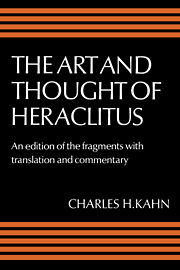 The Art and Thought of Heraclitus
The Art and Thought of Heraclitus On reading Heraclitus
Published online by Cambridge University Press: 26 February 2010
Summary
It has been noted that every age and philosophical perspective, from Cratylus to the Neoplatonists and the fathers of the Church, projected its own meaning and its own preoccupations onto the text of Heraclitus. This is a familiar enough phenomenon in the history of ideas: every generation and every school has its own reading of Plato, Kant, or Marx. But Heraclitus is an acute case. By the ambivalent and enigmatic quality of his utterance he lends himself as few authors do to the free play of interpretation. So it has often seemed that the task of modern scholarship was simply to undo the work of history: to strip away the various levels of exegesis and distortion deposited by the centuries, in order to recover the original meaning of the preserved text.
Such is indeed the task of conscientious philology, and I have tried wherever possible to construe Heraclitus' meaning within the context of his own time and place. But in principle the effort to recover the authentic Heraclitus, that is, to attain a uniquely correct interpretation, is an enterprise that can never succeed. We are not only confronted with the warning of the onion: if we peel off all the layers of interpretation there may be nothing left, or nothing of any interest. There is the more fundamental problem that we, good classical scholars that we are, are also historical beings with a certain perspective, who can only see what is visible from where we happen to be standing. For Diels and Burnet, the standpoint was that of the late nineteenth century.
- Type
- Chapter
- Information
- The Art and Thought of HeraclitusA New Arrangement and Translation of the Fragments with Literary and Philosophical Commentary, pp. 87 - 95Publisher: Cambridge University PressPrint publication year: 1979


